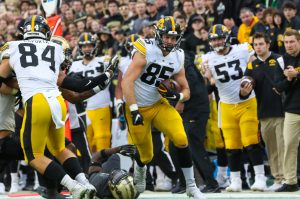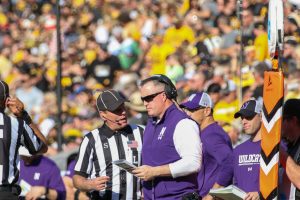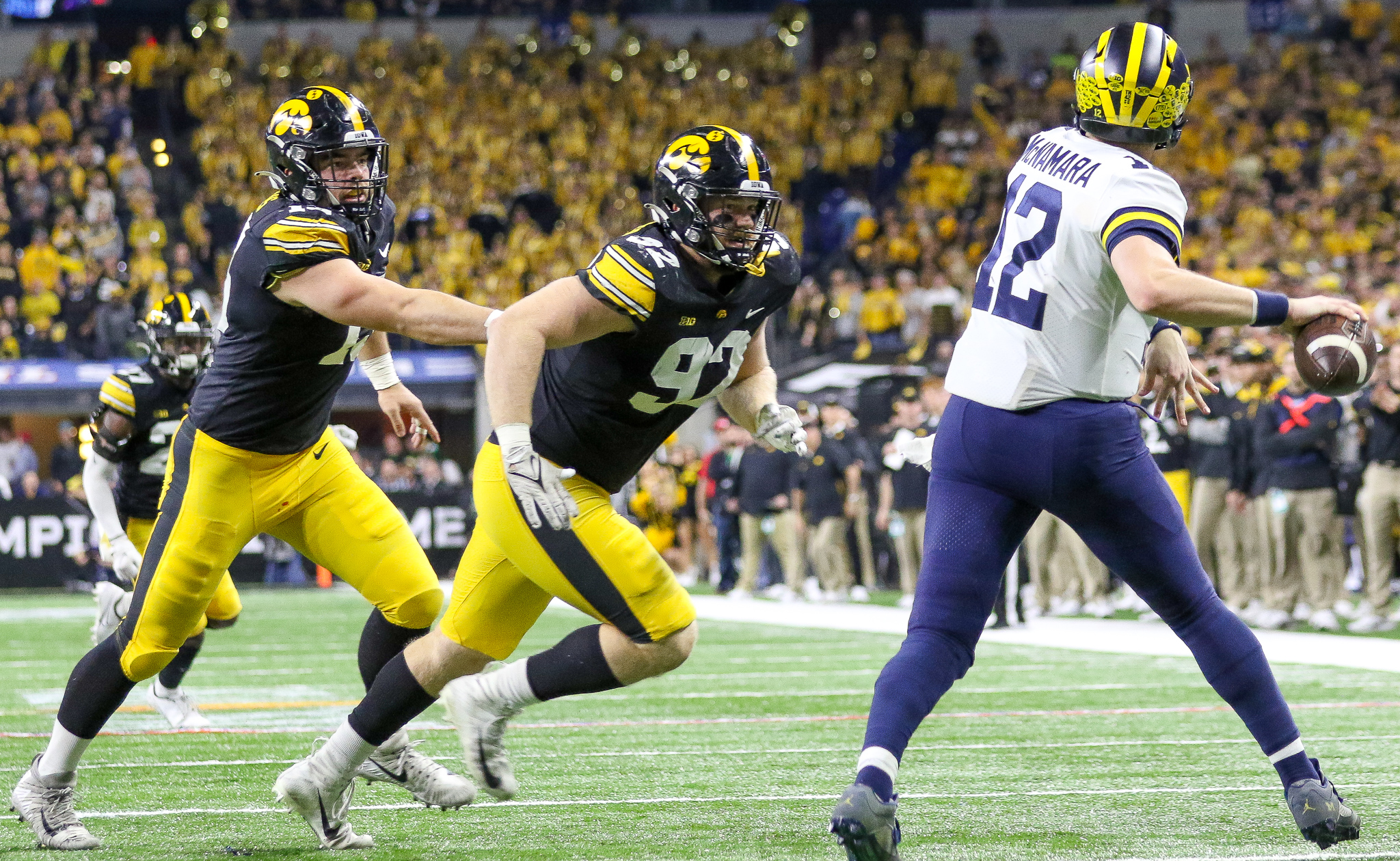My very early case for Iowa winning mediocre Big Ten West Division next season
By Pat Harty
IOWA CITY, Iowa – Am I convinced that the Iowa football team will be good on offense next season with Cade McNamara playing quarterback, and with the other additions to the offense from the transfer portal, and with another year of experience?
No.
Do I think Iowa has a legitimate chance of winning the Big Ten West Division for the second time in the three years?
Yes.
Even with Brian Ferentz calling the plays as the as offensive coordinator.
It’s reasonable to think that the offense will be better with McNamara behind center, and with Erick All combining with Luke Lachey to form a potent one-two punch at tight end, and with possibly two new starters on the offensive line with the additions of Daijon Parker and Rusty Feth from the portal, and with Seth Anderson helping at receiver after having been a standout performer at FCS member Charleston Southern.
Those all appear to be positive additions, especially McNamara, who led Michigan to the 2021 Big Ten title, and to the college playoff as its starting quarterback.
There is a belief that the offense will be better with McNamara behind center compared to the previous three seasons when Spencer Petras took most of the snaps at quarterback for Iowa.

But that really isn’t setting a high bar because the offense could be mediocre to average with McNamara playing quarterback and that still would be a significant improvement, considering Iowa finished last season ranked 130th out of 131 FBS teams in total offense, and averaged just 17 points per game.
It’s hard to think of when the bar has been set lower on offense at Iowa.
You probably would have to go all the way back to the 1970s when Iowa ranked among the worst teams in the country throughout the decade.
Much will be expected from McNamara, especially now that Iowa has to win at least seven games and average at least 25 points per game to meet the designated performance objectives that were recently added to Brian Ferentz’s contract.
But on the other hand, winning at least seven games and averaging 25 points per game would be considered average in most places.
It really isn’t fair that the players will be put in the position of trying to help Brian Ferentz meet the designated performance objectives because that storyline will fester throughout the season.
McNamara and his offensive cohorts will be asked about it all the time, unless Iowa puts a stop to it, which could happen.
And for everything McNamara accomplished at Michigan, he played behind arguably the best offensive line in the country, and he had three stud running backs and a talented group of receivers to help carry the load.
He won’t have that luxury at Iowa.
But as for winning the 2023 Big Ten West Division, a case certainly could be made for the Hawkeyes in spite of the offensive deficiencies, because frankly, the West Division doesn’t look very good, at least on paper.
Iowa won the West and finished 10-3 in 2021 despite having an offense that left much to be desired.
No disrespect to the other six teams in the West Division, but none of them show signs of being elite, at least not at this stage.
That could always change when the games start being played.
But every team in the West has flaws.
Wisconsin and Nebraska both have new head coaches, and have added some key pieces from the transfer portal, so the energy and enthusiasm is high with both fan bases.
Wisconsin has added 23-year old quarterback Tanner Mordecai from the transfer portal, and his numbers are impressive to say the least as he passed for over 3,500 yards in each of the past two seasons at Southern Methodist University.

New Wisconsin head coach Luke Fickell is also highly respected after what he accomplished as the head coach at Cincinnati where he compiled a 57-18 record over six seasons.
His 2021 squad finished 13-1 and made the college playoff.
Badger fans have reason to be optimistic, but they would be foolish to think that everything has been fixed just based on the offseason changes.
There is a perception that Fickell has been highly successful with every challenge that he has faced while climbing the coaching the ladder.
But that isn’t true because he only finished with a 6-7 record as the interim head coach at his alma mater, Ohio State, in 2011.
A 6-7 record at Ohio State would be like finishing 3-9 or 2-10 at Iowa.
Nebraska’s decision to hire Matt Rhule as its new head coach has the fans convinced that the glory days will soon return.
But that happens every time Nebraska hires a new head coach.
Scott Frost was considered the savior when Nebraska hired him as head coach in 2018.
He checked all the boxes as a Nebraska native, and as former Nebraska quarterback who had led the Cornhuskers to a national title, and after what he had accomplished in just two seasons as the head coach at Central Florida, including finishing 13-0 in 2017.
But instead of adding to his legend, Frost had four consecutive losing seasons at Nebraska and was then fired three games into the 2022 season.
The same hype and expectations that accompanied Frost to Nebraska have been rekindled with the hiring of Rhule, who returns to college after compiling an 11-27 record as the head coach of the NFL’s Carolina Panthers.
Rhule was fired in Carolina after losing four of his first five games this past season.
Nebraska fans would be quick to point out that Rhule had success as the head coach at both Temple and Baylor before giving the NFL shot, and that Nick Saban also struggled as an NFL head coach, but now ranks as arguably the greatest college head coach of all time.
But comparing Rhule to Saban at this stage is quite a stretch, even for Nebraska fans.
Rhule might prove to be the long-awaited answer for Nebraska, but there is no proof of that happening right now.
The other four teams in the West also have issues, including defending West champion Purdue where Jeff Brohm is no longer the head coach, much to the delight of Iowa fans since Brohm had a knack for defeating Iowa.
Brohm has been replaced by former Illinois defensive coordinator Ryan Walters.
Purdue also has to replace its starting quarterback, its best receiver in Charlie Jones and star tight end Payne Durham.
And with Walters being a defensive coach, Purdue might look at lot different next season on offense.

Illinois also has to replace its starting quarterback and star running back Chase Brown, who has declared for the 2023 NFL Draft.
Bret Bielema has made Illinois respectable again, but his offense could take a step back next season.
Minnesota also faces uncertainty at quarterback, and while head coach P.J. Fleck has made the Gopher program respectable again, he still hasn’t defeated Iowa.
The Gophers will also be without star running back Mohamed Ibrahim, who is now preparing for the 2023 NFL draft.
And then last and maybe least is Northwestern, which finished 1-11 this past season under veteran head coach Pat Fitzgerald, whose knack for proving the doubters and naysayers wrong as the head coach for his alma mater isn’t as strong as it used to be.
Northwestern’s performance this past season was reminiscent of the 1970s and 1980s when it was overmatched in most Big Ten games.
It’s hard to see that changing dramatically in just on season, even with Fitzgerald leading the way.
So, to suggest that Iowa could win the West next season probably says more about the West Division than Iowa.
Iowa should be solid on defense, despite some key losses, and on special teams where punter Tory Taylor and kicker Drew Stevens might be the best punter/kicker combination in the country.
Iowa’s 2023 schedule also looks favorable on paper with nonconference games against Utah State, Iowa State, which is coming of a 4-8 season, and Western Michigan.
Iowa also doesn’t play Ohio State or Michigan, which is always cause for optimism.
Purdue won the West this past season with a 6-3 record in conference play, and six wins could be enough to win the West again next season.
Even with the negativity surrounding Brian Ferentz and the Iowa offense, a strong case still could be made for the Hawkeyes winning the West Division next season, almost by default.
Because all it might take is a mediocre offense combined with top-notch defense and special teams to meet the challenge.



